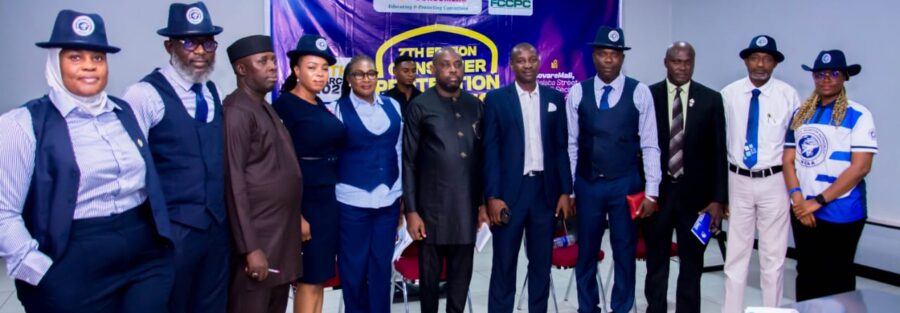- Conference Summary
This summary captures a one-day programme of presentations, panel discussions, keynote sessions, interactive dialogue and question and answer sessions at the conference on Transparent Information–Responsible Consumer in Nigeria, which took place at Novare Hall, Wuse Zone 5, Abuja, from 10:00 AM to 2:00 PM on Friday, 14th March 2025. www.savetheconsumers.org.ng
The event brought together over 200 participants both physical and online which include civil societies, journalists, regulators of goods and services in Nigeria and International Non-Governmental Organizations (INGO) to promote the theme Transparent Information–Responsible Consumer as a way of enlightening the public with their rights and responsibilities concerning consumer based issues as well as provide channels to solve the countless challenges that consumers face and how businesses providing goods and services.
- OVERALL IMPACTS OF THE CONFERENCE
The numbers are striking:
- Seventy-eight percent of overall participants believe the consumer protection conference is timely. www.savetheconsumers.org.ng
- Ninety-seven percent of participants think that there should be a consumer protection agency in each state.
- Nigerians were made to believe that the Unchecked terms and conditions have made the producers and service providers exploiting the consumers. FCCPC should design a platform to checkmate the term and condition
- The attendees agreed that there should be an effective consumer education program by the producers and service providers.
- Over 3 million Nigerians were reached during consumer protection conference/ world consumer rights day, through physical, online and media houses such as TV Continental (TVC), African Independent Television (AIT) and the Nigerian Television Authority (NTA) among others
- The conference brings Nigerians closer to Consumer education, as some regulatory agencies were in attendance.
It enables consumers to understand how to channel complaints appropriately to get redress if need be.
- CONFERENCE OPENING
Dr. Aliyu Ilias, Executive Director, Save the Consumers Initiative
The conference began with the National Anthem of the Federal Republic of Nigeria and a welcome address from Dr. Aliyu Ilias, Executive Director, Save the Consumers Initiative and the Organizers of the 7th Consumer Protection Conference 2025 edition.
He reiterated the importance of consumer education, and most especially with the peculiar situation where a person’s flight is been rescheduled without informing the person beforehand. He talked about this year’s theme, “Transparent Information–Responsible Consumer”, and the need for regulations and policies to protect flight and other product users. He noted that it is important to educate the consumers properly to enable them to understand their rights and the consequences of whatever product selection they make, and the need to demand redress where necessary.
Aliyu ilias also said the issue of consumer protection should also be treated as a Human rights issue in order to deal with organizations that abuse the rights of consumers, and the national human rights should take this recommendation as their major takeaway from this conference
The conference also recommends the consumer protection should not be left for FCCPC, that other agencies that has to do with enforcement should collaborate with FCCPC on the one hand, and on the other hand every state in Nigeria should have state consumer protection agency to actually help the consumer(s) to know their right and seek Compensation when their right as consumers are violated.
- BACKGROUND
The 7th annual consumer protection conference was held at Novare Mall on the 14th of March, 2025, with the theme, Transparent Information–Responsible Consumer. Over thirteen Organizations are in attendance, namely: FCCPC, NERC, NYSC, FCDA, FMAFS, FRCS, NCAA, AIT, NTA, NHRC, INEC, The Academia, ICP, SERVICOM, e.t.c. visit www.savetheconsumers.org.ng
Guest speaker: Dr. Ukpeli Peter : The central theme of the conference was exhaustively discussed by the guest speaker Dr. Ukpeli Peter, who said that the hallmark for the responsible consumer is transparent information, as the consumer is the first advertiser of your product and/or your services
The conference made the following observation during the conference discussions and debate;
- That the issue of consumer protection should be treated as a human right issue, as consumers need to be protected against toxic service provider(s).
- Producers and service providers are most often too quick in making a profit without providing transparent information to the consumer to make a decision about the patronage.
- The Federal Consumer Protection Agency are overwhelmed due to the magnitude of complaints it gets across Nigeria
- Consumers have no adequate information on transparent information how to seek justice when their rights as consumers are being violated
- Producer and service provider are not always faithful to accept their Errors when the rights of these consumers are violated
- SUMMARY OF PRESENTATION FROM FEDERAL COMPETITION AND CONSUMER PROTECTION COMMISSION (FCCPC) AT THE 7TH CONSUMER PROTECTION CONFERENCE/WORLD CONSUMERS DAY,2025
In Nigeria, where over 200 million consumers navigate a complex marketplace, from bustling open-air markets to digital platforms, transparency is not just a buzzword; it is a lifeline.
The lack of transparency directly translates into exploitative pricing, deceptive marketing, arbitrary billing, and hidden charges, all of which affect consumers adversely, undermine fair competition, and erode consumer trust.
One of the biggest concerns for Nigerian consumers today is exploitative pricing, especially in sectors where billing structures are unclear, consumers have no bargaining power, and price increases happen arbitrarily.
Challenges that Nigerian consumers face:
- Electricity Bills – Consumers are overbilled through estimated billing, even when they consume far less than what is charged. The FCCPC is working with sector regulators to enforce fair billing standards and transition to metered billing.
Telecom Deception – A mobile network operator advertises a bonus on recharges, but what they don’t disclose is that accepting the bonus automatically migrates the customer to a more expensive tariff plan with higher per-second charges. Visit www.savetheconsumers.org.ng
- Supermarket Pricing Scam – A consumer picks an item priced on the shelf, but at checkout, the scanned price is higher.
- Hidden Bank Charges – A bank advertises zero maintenance fees, but customers still see deductions labeled as “administrative costs” or “service charge”—a violation of fair disclosure practices.
- Airline Price Deception – A low-cost airline promotes cheap flight tickets, but by the time taxes, baggage fees, and undisclosed surcharges are added, the final price doubles.
- Pay-TV Pricing Manipulation – A Pay-TV provider increases subscription fees, but does not justify the cost hike or show any service improvements.
Solutions to the Challenges
To address these challenges, the Federal Competition and Consumer Protection Act (FCCPA) 2018 provides the legal basis for ensuring fair market practices. Some key provisions include:
- Section 114 – Businesses are required to provide information about their products and services in a manner that is easily understandable by consumers.
- Section 115 – Businesses have a responsibility to provide full disclosures of material facts, including prices of products and services. prices displayed must be equivalent to the point of payment or cash-out prices.
- Section 72 – Prohibits exploitative pricing and unfair billing practices.
Sections 32 & 33 – Grants the FCCPC investigative and enforcement powers against violators. Visit………. www.savetheconsumers.org.ng
These provisions highlight that transparency and fair dealings are not merely acts of corporate goodwill but legal obligations. Concealing or misrepresenting important information is not only unethical but also a direct violation of Nigerian law.
The FCCPC actively enforces the law to protect consumers from deceptive business practices and unfair competition. Some of our recent interventions include:
- Electricity Metering Issues – The FCCPC recently intervened in a major case of unfair meter replacement, ensuring that consumers are not forced to pay for meters unjustly.
- Supermarket Price Manipulation – The FCCPC conducted surprise inspections of supermarkets and penalized those found charging higher checkout prices than the displayed shelf prices.
- Pay-TV Pricing Investigation – A dominant player in the pay-TV industry was summoned to justify its price hike and ensure full disclosure of service changes.
- Beverage Labelling Sanctions – A major beverage company was fined for deceptive claims and misleading packaging.
These actions send a clear message that businesses that engage in deception, price manipulation, or exploitative billing will face regulatory consequences.
While FCCPC is committed to consumer protection, regulatory enforcement alone is not enough. Consumers must remain vigilant, demand accountability and consume responsibly.
Beyond transparency, responsible consumption is about making informed, ethical choices that benefit both consumers and society.
- Read product labels and service agreements carefully, whether it’s for financial contracts, food products, or digital subscriptions.
- Question unexplained charges; if an electricity bill seems excessive, demand a breakdown; if a bank deducts hidden fees, seek clarification.
- Compare prices and demand fair billing; ensure that supermarkets honor displayed prices.
- Report consumer rights violations and expose hidden fees, misleading advertisements, and exploitative pricing.
- Avoid impulse purchases influenced by deceptive discounts.
- Choose energy-efficient and environmentally sustainable products.
- Hold businesses accountable when they engage in misleading marketing.
Responsible consumption is a powerful tool for shaping a fairer, more sustainable economy



